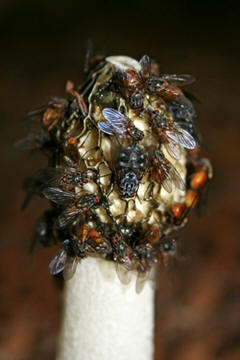Interactions:
As stated in the
habitat section,
the Dracula orchid is an epiphyte, or plant that uses another
plant, typically a tree for its physical support but does not
draw nourishment from it. This type of symbiotic relationship is
d%20resembles%20a%20mushroom.jpg)
Another symbiotic relationship that the Dracula orchid is a part of is a mutualism with flies. Mutualism is a symbiotic relationship in which both individuals benefit from. (+/+). Typically the flies (drosophilid mycophilous flies) found in the habitat of the Dracula orchid complete their live cycles on mushrooms. An interesting and somewhat sneaky method of pollination that the Dracula orchid uses is mimicry. The Dracula orchid’s labellum (central pedal) resembles, and smells like a mushroom. The flies, which normally are associated with mushrooms mistaken the labellum for the mushroom and fly into the flower, and mate and in the process of this, they become covered in pollen, fly to the next orchid, and pollinate the orchids. The flies benefit from this relationship by having a place to reproduce, and the orchid benefit by having an organism aid in passing on the pollen from one individual to the next.
For some neat and spooky
facts continue your search
Here
*For more cool symbiotic relationships check out other organisms
such as the
Apple Guava
